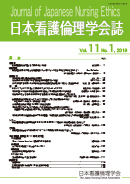Volume 11, Issue 1
Displaying 1-18 of 18 articles from this issue
- |<
- <
- 1
- >
- >|
Editorial
-
2019 Volume 11 Issue 1 Pages 1-2
Published: March 20, 2019
Released on J-STAGE: May 24, 2019
Download PDF (217K)
Special Article
-
2019 Volume 11 Issue 1 Pages 3-12
Published: March 20, 2019
Released on J-STAGE: May 24, 2019
Download PDF (507K)
Original Articles
-
2019 Volume 11 Issue 1 Pages 13-19
Published: March 20, 2019
Released on J-STAGE: May 24, 2019
Download PDF (446K) -
2019 Volume 11 Issue 1 Pages 20-29
Published: March 20, 2019
Released on J-STAGE: May 24, 2019
Download PDF (541K) -
2019 Volume 11 Issue 1 Pages 30-39
Published: March 20, 2019
Released on J-STAGE: May 24, 2019
Download PDF (496K)
Notes
-
2019 Volume 11 Issue 1 Pages 40-49
Published: March 20, 2019
Released on J-STAGE: May 24, 2019
Download PDF (449K) -
2019 Volume 11 Issue 1 Pages 50-58
Published: March 20, 2019
Released on J-STAGE: May 24, 2019
Download PDF (500K) -
2019 Volume 11 Issue 1 Pages 59-66
Published: March 20, 2019
Released on J-STAGE: May 24, 2019
Download PDF (470K) -
2019 Volume 11 Issue 1 Pages 67-74
Published: March 20, 2019
Released on J-STAGE: May 24, 2019
Download PDF (544K) -
2019 Volume 11 Issue 1 Pages 75-82
Published: March 20, 2019
Released on J-STAGE: May 24, 2019
Download PDF (428K) -
2019 Volume 11 Issue 1 Pages 83-90
Published: March 20, 2019
Released on J-STAGE: May 24, 2019
Download PDF (624K) -
2019 Volume 11 Issue 1 Pages 91-99
Published: March 20, 2019
Released on J-STAGE: May 24, 2019
Download PDF (438K)
Letter
-
2019 Volume 11 Issue 1 Pages 100-102
Published: March 20, 2019
Released on J-STAGE: May 24, 2019
Download PDF (316K)
Other
-
2019 Volume 11 Issue 1 Pages 103-104
Published: March 20, 2019
Released on J-STAGE: May 24, 2019
Download PDF (357K)
11th Annual Conference of Japan Nursing Ethics Association
President’s Address
-
2019 Volume 11 Issue 1 Pages 105-106
Published: March 20, 2019
Released on J-STAGE: May 24, 2019
Download PDF (237K)
Educational Lecture
-
2019 Volume 11 Issue 1 Pages 107-108
Published: March 20, 2019
Released on J-STAGE: May 24, 2019
Download PDF (215K)
Special Lecture
-
2019 Volume 11 Issue 1 Pages 109-110
Published: March 20, 2019
Released on J-STAGE: May 24, 2019
Download PDF (260K)
Symposium
-
2019 Volume 11 Issue 1 Pages 111-113
Published: March 20, 2019
Released on J-STAGE: May 24, 2019
Download PDF (338K)
- |<
- <
- 1
- >
- >|
